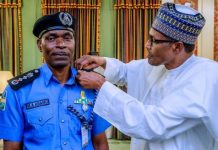Table of Contents
Top list of all the Ranks in the Nigerian Police Force and how to Apply for them
Rank is the relative position, complexity, power, importance, value, worth, authority, level. However, In Nigeria police force the official ranking is divided into 3 structures:
- Authority
- Administrative
- Organizational structure.
Let us consider the ranking under the authority structure from top to bottom in Nigeria police force.

The Authority Structure of the Nigerian Police Force
The Inspector-General of Police
In accordance with section 215(2) of the 1999 Constitution, section 6 of the Police Act, 1990, “the Force shall be commanded by the Inspector-General of Police”.
This implies that instructions, directives, and orders come from the Inspector-General of Police to an officer to perform his or her duties. Hence, the Inspector General of Police is the highest rank in the Nigeria police force.
The Deputy Inspector-General of Police
According to section 7(1) of the Police Act, the Deputy Inspector General of Police is the second in Command of the Force and shall so act for him in the Inspector-General’s absence.
Section 7(1) of the police act implies that after the IG is the DIG and any other rank below the IG received a command from the DIG in the performance of their lawful duties.
The Asst. Inspector-General of Police
According to section 5 and 8 of the Nigerian police act, as the name implies the Asst.inspector general is to act in the absents of Inspector-General and the Deputy Inspector-General of Police. It is the 3rd rank under the authority structure of the Nigeria police force.
The Commissioner of Police (In-charge of contingents in a state)
Section 5 of the Police Act, in accordance with the provisions of section 215 (2), of the Nigeria Constitution, provides for the Office and rank of a Commissioner of Police who shall be in Control of contingents of the Police Force stationed in a State. He is subject, however, to the command of the Inspector-General of Police or who-so-ever acts for him, in his absence.
Every other rank in the Force is legally provided for by section 5 of the Police Act. The Command structure of the Nigeria Police can be presented in order of hierarchy as in the chain here under.
- The Deputy Commissioner of Police
- The Asst. Commissioner of Police
- The Chief Superintendent of Police
- The Superintendent of Police
- The Deputy Superintendent of Police
- The Asst. Superintendent of Police
- The Inspector of Police
- Sergeant Major
- Sergeant
- Corporal
- Constable

The Administrative Structure of the Nigerian Police Force
The administrative structure of the Nigerian police force is divided into the department, ranging from ‘A’ – ‘G’ with each department charged with similar duties. Although their duties are inter-woven, they are distinguishable.
‘A’ DEPARTMENT:- ADMINISTRATION
This department is responsible for the co-ordination, supervision, and Direction of other departments within the Nigerian Police Force.
‘B’ DEPARTMENT:- OPERATION
It is the duty of the ‘B’ department to plane, organize, and monitor the internal security of the country.
‘C’ DEPARTMENT:- LOGISTICS AND SUPPLY
All the needed tools for operation by the Nigerian Police force of Nigeria is supply by this department.Suchlike:
- Planning for building programmes.
- Construction and maintenance of Police Buildings and quarters,
- Determination of costs of all equipment, e.g. vehicles, Bomb Disposal equipment Arms & Ammunition .etc.
‘D’ DEPARTMENT:- INVESTIGATION AND INTELLIGENCE
This department is responsible for criminal Investigations; Interpol, Crime Prevention Policies, Narcotics, Forensic Matters, Crime Records, Prosecution and Criminal Intelligence.
‘E’ DEPARTMENT:- TRAINING AND COMMAND
Formulation and implementation of training policy and plan for the Nigerian Police Force. Well researched training programmes to keep pace with modern thought in the field of training, staff development and equipment.
‘F’ DEPARTMENT
The ‘F’ department is responsible for research, Planning, Inspectorate Division, Management Information, Organization and Method
‘G’ DEPARTMENT (ICT)
The ICT department has become an important department and rightly so, as ICT has become a very important tool in fighting crime.
It is tasked with the duties of developing and implementing ICT Policies and programmes for the Nigeria Police Force.
OFFICE OF THE FORCE SECRETARY
The office of the force secretary is tasked with the duties of Promotion and appointment of Superior Police Officers, Deployment of Superior Police Officers, keeping records of Superior Police Officers, Discipline of Superior Police Officers, Police Council meeting, Inter-Ministerial matter; and Promotion Boards.
The Organizational Structure of The Nigerian Police Force
The organizational structure of the Police Force is represented as shown below:
- Force Headquarters
- Zonal Headquarters
- State Commands Headquarters
- Area Commands Headquarters
- Divisional Police Headquarters
- Police Station
- Police Post
- Village Police Post.
How to Apply
There are two ways which you can apply to the Nigeria police force. You can apply by visiting their official website @ www.npf.gov.ng
- Joining the Force through Mass Recruitment
| Rank | Qualification Needed | Monthly Salary (Naira) |
| Police Constable | O’ level certificate with at least five credit including maths and English. | 43,293 |
| Cadet Inspector of Police
| A level, OND, NCE, and O’ level certificate with five credits including maths and English. | 73,231 |
| Cadet Assistant Superintendent of Police
| HND or Bachelor degree, NYSC certificate. | 127,604 |
2. Joining the Force through The Police Academy
Below are the basic requirement needed to apply. Also, visit their website for more information.
- Applicant must not be less than 1.67m tall for men and 1.63m for women.
- Must have an expanded chest measurement of 86.34cm for men.
- The applicant must not be an ex-convict.
- Must be a Nigerian citizen.
- He/she must be medically, mentally and physically fit.
- Must have an ID, either the national ID, voter’s card or other valid forms of identification.
- Must provide two verifiable references from either a traditional ruler or local government chairman or from other eligible persons as recommended by the police.
Source: https://www.ranksng.com/ranks-in-nigeria-police-force/




